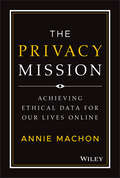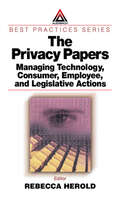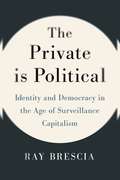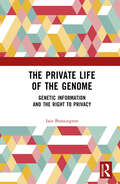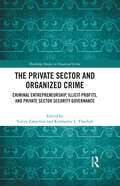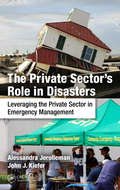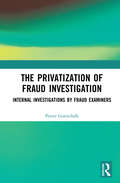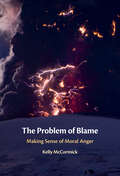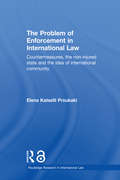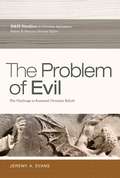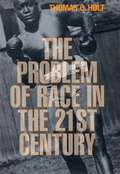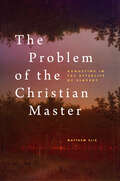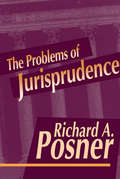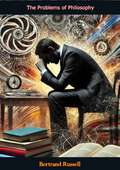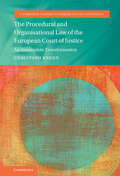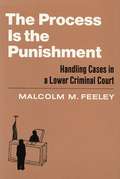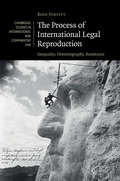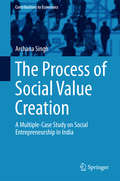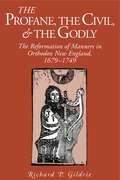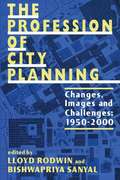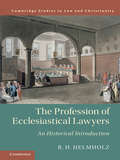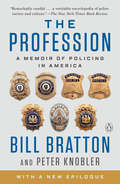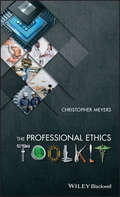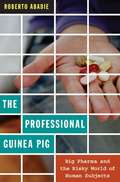- Table View
- List View
The Privacy Mission: Achieving Ethical Data for Our Lives Online
by Annie MachonFuture-proof yourself and your organization against known threats to privacy and online safety The subject of data ethics has never been more urgent. This is no longer an academic or niche geek issue as it has been since the inception of the internet and the world wide web. Data ethics is an issue that affects all of us now as our personal and professional lives increasingly take place online. Who controls access to the hardware, who runs the software, who can spy on us, hack us, data farm us? What are the threats that we need to mitigate against democratically, societally, and personally? How can corporations protect us and how can that help their bottom line?The Privacy Mission aims to answer these questions and summarise both the overarching concepts and principles about why data ethics is important. It offers practical solutions for companies, policy makers and individuals to push back against known threats and future proof themselves going forward.
The Privacy Papers: Managing Technology, Consumer, Employee and Legislative Actions (ISSN)
by Rebecca HeroldToday, more than ever, organizations have to cope with increased concerns regarding privacy issues. These concerns are not limited to consumer fears about how information collected by Web sites will be used or misused. They also involve broader issues, including data collected for direct response marketing, privacy of financial and health records,
The Private Is Political: Identity and Democracy in the Age of Surveillance Capitalism
by Ray BresciaExposes the threats to our personal and political identity in the age of surveillanceIt has become alarmingly clear that our online actions are less private than we’re led to believe. Our data is routinely sold and shared with companies who want to sell us something, political actors who want to analyze our behavior, and law enforcement who seek to limit our actions.The Private is Political explores the failure of existing legal systems and institutions to protect our online presence and identities. Examining the ways in which the digital space is under threat from both governments and private actors, Ray Brescia reveals how the rise of private surveillance prevents individuals from organizing with others who might help to catalyze change in their lives. Brescia argues that we are not far from a world where surveillance chills not just our speech, but our very identities. This will ultimately stifle our ability to live full lives, realize democracy, and even shape the laws that affect our privacy itself.Beyond merely identifying the harms to individuals from privacy violations, Brescia furthers our understanding of privacy by identifying and naming political privacy and the integrity of identity as central to democracy. The Private is Political empowers consumers by outlining a roadmap for a comprehensive privacy regime, leveraging various institutions to collectively safeguard privacy rights.
The Private Life of the Genome: Genetic Information and the Right to Privacy
by Iain BrassingtonThis innovative and engaging book argues that because our genetic information is directly linked to the genetic information of others, it is impossible to assert a ‘right to privacy’ in the same way that we can in other areas of life. This position throws up questions around access to sensitive data. It suggests that we may have to abandon certain intuitions about who may access our genetic information; and it raises concerns about discrimination against people with certain genetic characteristics. But the author asserts that regulating access to genetic information requires a more nuanced perspective that does not rely on the familiar language of rights. The book proposes new ways in which we may think about who has access to what genetic information, and on what basis they do so. Conceptually challenging, the book will prove engaging reading for scholars and students interested in the area of bioethics and medical law, as well as policy makers working with these pressing issues.
The Private Sector and Organized Crime: Criminal Entrepreneurship, Illicit Profits, and Private Sector Security Governance (Routledge Studies in Organised Crime)
by Yuliya ZabyelinaThis book contributes to the literature on organized crime by providing a detailed account of the various nuances of what happens when criminal organizations misuse or penetrate legitimate businesses. It advances the existing scholarship on attacks, infiltration, and capture of legal businesses by organized crime and sheds light on the important role the private sector can play to fight back. It considers a range of industries from bars and restaurants to labour-intensive enterprises such as construction and waste management, to sectors susceptible to illicit activities including transportation, wholesale and retail trade, and businesses controlled by fragmented legislation such as gambling. Organized criminal groups capitalize on legitimate businesses beleaguered by economic downturns, government regulations, natural disasters, societal conflict, and the COVID-19 pandemic. To survive, some private companies have even become the willing partners of criminal organizations. Thus, the relationships between licit businesses and organized crime are highly varied and can range from victimization of businesses to willing collusion and even exploitation of organized crime by the private sector – albeit with arrangements that typically allow plausible deniability. In other words, these relationships are highly diverse and create a complex reality which is the focus of the articles presented here. This book will appeal to students, academics, and policy practitioners with an interest in organized crime. It will also provide important supplementary reading for undergraduate and graduate courses on topics such as transnational security issues, transnational organized crime, international criminal justice, criminal finance, non-state actors, international affairs, comparative politics, and economics and business courses.
The Private Sector's Role in Disasters: Leveraging the Private Sector in Emergency Management
by Alessandra Jerolleman John J. KieferThis book examines the role of the private sector in emergency management and how that role is changing through private sector intersections with government, government agencies, and the public sectors in all phases of emergency management. It particularly focuses on the areas in which government regulations and guidelines promote or encourage priv
The Private Sector's Role in Disasters: Leveraging the Private Sector in Emergency Management
by Alessandra Jerolleman John J. KieferThis book examines the role of the private sector in emergency management and how that role is changing through private sector intersections with government, government agencies, and the public sectors in all phases of emergency management. It particularly focuses on the areas in which government regulations and guidelines promote or encourage priv
The Privatization of Fraud Investigation: Internal Investigations by Fraud Examiners
by Petter GottschalkThis book discusses privatization of law enforcement in relation to suspected corporate crime and recommends guidelines for successful fraud examinations. There is a growing business for global auditing and local law firms to conduct internal investigations at client organizations when there is suspicion of white-collar misconduct and crime. This book reflects on the work by these private fraud examiners in terms of an evaluation of their investigation reports. The book brings an original theoretical and methodological approach to investigations of white-collar crime. It develops the theory of convenience as an explanation for motive, opportunity, and willingness to commit and conceal white-collar crime. This theory is then related to the case studies. Structured in such a way as to allow the reader to use the text as a nonsequential reference source or guide to a set of connected issues, the book illustrates the practice of privatization by cases and presents guidelines for successful fraud examination. As an investigation can lead to conviction and incarceration, this privatization of crime investigation feeds into the larger issue of privatization of policing. The work will be a valuable resource for students, academics, and practitioners working in the areas of Criminal Justice, Corporate Law, and Business.
The Problem of Blame: Making Sense of Moral Anger
by Kelly McCormickThis book makes a case for the permissibility of reactive blame – the angry, harmful variety. Blame is a thorny philosophical problem, as it is notoriously difficult to specify the conditions under which an agent is deserving of blame, is deserving of blame in the basic sense, and furthermore why this is so. Kelly McCormick argues that sharpening the focus to reactive, angry blame can both show us how best to characterize the problem itself, and suggest a possible solution to it, because even reactive blame is both valuable and deserved in the basic sense. Finally, McCormick shows how, despite the many facets of the dark side of blame, adopting an explicitly victim-centered approach highlights a powerful argument from empathy for retaining reactive blame and its attendant attitudes and practices.
The Problem of Enforcement in International Law: Countermeasures, the Non-Injured State and the Idea of International Community (Routledge Research in International Law)
by Elena Katselli ProukakiThis book explores the contentious topic of how collective and community issues should be protected and enforced in international law. Elena Katselli Proukaki takes a detailed look at the issue of third-State countermeasures, and considers the work the International Law Commission has done in this area. The volume addresses both the theory and practice of third-State countermeasures within international law. Critically reviewing the conclusions of the International Law Commission on the non-existence of a right to third-State countermeasures, it includes consideration of examples of State practice not previously covered in the literature of this topic. In taking a thorough view of the issues involved the author identifies concerns about third-State countermeasures which remain unanswered, and considers the possible legal ramifications arising from a clash between a right to third-State countermeasures and obligations arising from other international norms. The Problem of Enforcement in International Law explores questions evolving around the nature, integrity and effectiveness of international law and the role it is called to play in a contemporary context. This book is of great interest and value not only for specialists in this area of international law, but also human rights, trade and EU lawyers, practitioners, legal advisers, and students.
The Problem of Evil: The Challenge to Essential Christian Beliefs
by Jeremy EvansThis book offers a comprehensive examination of the problem of evil from both technical and ministerial perspectives. Author and acclaimed philosophy professor Jeremy A. Evans treats the history of the problem with fairness, looking at it through contemporary philosophical literature and offering responses to the most substantive arguments from evil. His purpose is to provide holistic responses to the problem of evil that are philosophically and theologically maintainable. Among the chapters are “Introduction to the Problem of Evil,” “The Logical Problem of Evil,” “The Evidential Problem of Evil,” “The Problem of Hell,” “The Problem of Divine Hiddenness,” “The Defeat of Evil,” “Moral Evil: Comparing Theism and Naturalism,” and “Evil and the Worship Worthiness of God.”
The Problem of Race in the Twenty-First Century
by Thomas C. HoltThis brief book speaks powerfully to the question of how the circumstances of race and racism have changed in our time--and how these changes will affect our future. Foremost among the book's concerns are the contradictions and incoherence of a system that idealizes black celebrities in politics, popular culture, and sports even as it diminishes the average African-American citizen. The world of the assembly line, boxer Jack Johnson's career, and The Birth of a Nation come under Holt's scrutiny as he relates the malign progress of race and racism to the loss of industrial jobs and the rise of our modern consumer society. Understanding race as ideology, he describes the processes of consumerism and commodification that have transformed, but not necessarily improved, the place of black citizens in our society. As disturbing as it is enlightening, this timely work reveals the radical nature of change as it relates to race and its cultural phenomena. It offers conceptual tools and a new way to think and talk about racism as social reality.
The Problem of the Christian Master: Augustine in the Afterlife of Slavery
by Matthew EliaA bold rereading of Augustinian thought for a world still haunted by slavery Over the last two decades, scholars have made a striking return to the resources of the Augustinian tradition to theorize citizenship, virtue, and the place of religion in public life. However, these scholars have not sufficiently attended to Augustine&’s embrace of the position of the Christian slaveholder. To confront a racialized world, the modern Augustinian tradition of political thought must reckon with its own entanglements with the afterlife of the white Christian master. Drawing Augustine&’s politics and the resources of modern Black thought into extended dialogue, Matthew Elia develops a critical analysis of the enduring problem of the Christian master, even as he presses toward an alternative interpretation of key concepts of ethical life—agency, virtue, temporality—against and beyond the framework of mastery. Amid democratic crises and racial injustice on multiple fronts, the book breathes fresh life into conversations on religion and the public square by showing how ancient and contemporary sources at once clash and converge in surprising ways. It imaginatively carves a path forward for the enduring humanities inquiry into the nature of our common life and the perennial problem of social and political domination.
The Problems of Jurisprudence
by Richard A. PosnerIn this book, one of our country’s most distinguished scholar-judges shares with us his vision of the law. For the past two thousand years, the philosophy of law has been dominated by two rival doctrines. One contends that law is more than politics and yields, in the hands of skillful judges, correct answers to even the most difficult legal questions; the other contends that law is politics through and through and that judges wield essentially arbitrary powers. Rejecting these doctrines as too metaphysical in the first instance and too nihilistic in the second, Richard Posner argues for a pragmatic jurisprudence, one that eschews formalism in favor of the factual and the empirical. Laws, he argues, are not abstract, sacred entities, but socially determined goads for shaping behavior to conform with society’s values. Examining how judges go about making difficult decisions, Posner argues that they cannot rely on either logic or science, but must fall back on a grab bag of informal methods of reasoning that owe less than one might think to legal training and experience. Indeed, he reminds us, the greatest figures in American law have transcended the traditional conceptions of the lawyer’s craft. Robert Jackson did not attend law school and Benjamin Cardozo left before getting a degree. Holmes was neither the most successful of lawyers nor the most lawyerly of judges. Citing these examples, Posner makes a plea for a law that frees itself from excessive insularity and takes all knowledge, practical and theoretical, as grist for its mill. The pragmatism that Posner espouses implies looking at problems concretely, experimentally, without illusions, with an emphasis on keeping diverse paths of inquiry open, and, above all, with the insistence that social thought and action be evaluated as instruments to desired human goals rather than as ends in themselves. In making his arguments, he discusses notable figures in jurisprudence from Antigone to Ronald Dworkin as well as recent movements ranging from law and economics to civic republicanism, and feminism to libertarianism. All are subjected to Posner’s stringent analysis in a fresh and candid examination of some of the deepest problems presented by the enterprise of law.
The Problems of Philosophy
by Bertrand RussellDive into the foundational questions of philosophy with Bertrand Russell's The Problems of Philosophy. This classic work, penned by one of the 20th century's most influential philosophers, provides an accessible and thought-provoking introduction to philosophical inquiry.Bertrand Russell, a renowned philosopher, logician, and Nobel laureate, examines some of the most enduring problems in philosophy, presenting them in a clear and engaging manner. Russell explores fundamental questions about the nature of reality, knowledge, and the limits of human understanding. Russell's lucid writing and keen analytical skills make complex philosophical concepts approachable for readers of all backgrounds.In this seminal text, Russell addresses key topics such as the distinction between appearance and reality, the existence and nature of matter, the theory of knowledge, and the problem of induction. He also delves into the nature of truth and falsehood, the limits of philosophical knowledge, and the relationship between philosophy and science.Russell's exploration is not merely theoretical; he provides concrete examples and practical applications of philosophical ideas, demonstrating their relevance to everyday life. His balanced approach combines rigorous analysis with a deep appreciation for the wonder and curiosity that drive philosophical inquiry.The Problems of Philosophy is an essential read for students of philosophy, educators, and anyone interested in deepening their understanding of the world. Russell's insightful and compelling treatment of philosophical issues invites readers to think critically about the nature of reality and our place within it.Join Bertrand Russell on a journey through the key questions that have shaped philosophical thought for centuries. The Problems of Philosophy remains a timeless and influential work, offering readers a profound and accessible guide to the enduring questions of human existence.
The Procedural and Organisational Law of the European Court of Justice: An Incomplete Transformation (Cambridge Studies in European Law and Policy)
by Christoph KrennHow should judges of the European Court of Justice be selected, who should participate in the Court's proceedings and how should judgments be drafted? These questions have remained blind spots in the normative literature on the Court. This book aims to address them. It describes a vast, yet incomplete transformation: Originally, the Court was based on a classic international law model of court organisation and decision-making. Gradually, the concern for the effectiveness of EU law led to the reinvention of its procedural and organisational design. The role of the judge was reconceived as that of a neutral expert, an inner circle of participants emerged and the Court became more hierarchical. While these developments have enabled the Court to make EU law uniquely effective, they have also created problems from a democratic perspective. The book argues that it is time to democratise the Court and shows ways to do this.
The Process is the Punishment: Handling Cases in a Lower Criminal Court
by Malcolm M. FeeleyIt is conventional wisdom that there is a grave crisis in our criminal courts: the widespread reliance on plea-bargaining and the settlement of most cases with just a few seconds before the judge endanger the rights of defendants. Not so, says Malcolm Feeley in this provocative and original book. Basing his argument on intensive study of the lower criminal court system, Feeley demonstrates that the absence of formal “due process” is preferred by all of the court’s participants, and especially by defendants. Moreover, he argues, “it is not all clear that as a group defendants would be better off in a more ‘formal’ court system,” since the real costs to those accused of misdemeanors and lesser felonies are not the fines and prison sentences meted out by the court, but the costs incurred before the case even comes before the judge—lost wages from missed work, commissions to bail bondsmen, attorney’s fees, and wasted time. Therefore, the overriding interest of the accused is not to secure the formal trappings of the judicial process, but to minimize the time, and money, spent dealing with the court. Focusing on New Haven, Connecticut’s, lower court, Feeley found that the defense and prosecution often agreed that the pre-trial process was sufficient to “teach the defendant a lesson.” In effect, Feeley demonstrates that the informal practices of the lower courts as they are presently constituted are more “just” than they are usually given credit for being. “... a book that should be read by anyone who is interested in understanding how courts work and how the criminal sanction is administered in modern, complex societies.”— Barry Mahoney, Institute for Court Management, Denver “It is grounded in a firm grasp of theory as well as thorough field research.”—Jack B. Weinstein, U.S. District Court Judge." a feature that has long been the hallmark of good American sociology: it recreates a believable world of real men and women.”—Paul Wiles, Law & Society Review. "This book's findings are well worth the attention of the serious criminal justice student, and the analyses reveal a thoughtful, probing, and provocative intelligence....an important contribution to the debate on the role and limits of discretion in American criminal justice. It deserves to be read by all those who are interested in the outcome of the debate." —Jerome H. Skolnick, American Bar Foundation Research Journal
The Process of International Legal Reproduction: Inequality, Historiography, Resistance (Cambridge Studies in International and Comparative Law #137)
by Rose ParfittThat all states are free and equal under international law is axiomatic to the discipline. Yet even a brief look at the dynamics of the international order calls that axiom into question. Mobilising fresh archival research and drawing on a tradition of unorthodox Marxist and anti-colonial scholarship, Rose Parfitt develops a new 'modular' legal historiography to make sense of the paradoxical relationship between sovereign equality and inequality. Juxtaposing a series of seemingly unrelated histories against one another, including a radical re-examination of the canonical story of Fascist Italy's invasion of Ethiopia, Parfitt exposes the conditional nature of the process through which international law creates and disciplines new states and their subjects. The result is a powerful critique of international law's role in establishing and perpetuating inequalities of wealth, power and pleasure, accompanied by a call to attend more closely to the strategies of resistance that are generated in that process.
The Process of Social Value Creation: A Multiple-Case Study on Social Entrepreneurship in India (Contributions to Economics)
by Archana SinghThis book discusses social entrepreneurship, especially in context of India. It focuses on understanding the whole process of social value creation, i.e. social entrepreneurship - opportunity identification, resource mobilisation, social value, capabilities of social entrepreneurs and innovation in three different types of social enterprises – (i) non-profit or charitable ones; (ii) non-profit social enterprise, sustainable with the combined income of grants, subsidies and own earned income; self-sustainable not-for-profit social enterprise; and hybrid social enterprise; and (iii) for-profit social enterprises. Sample cases of social entrepreneurs (Ashoka Fellows) were selected from three inter-linked sectors -- health, education and livelihood. To provide a comprehensive view, interviews were taken not only from the founders (social entrepreneurs), management personnel, and other employees, but also from the beneficiaries. The book comprises how, on the basis of cross-comparison between three types of social enterprises, several propositions and finally theoretical framework on social entrepreneurship have been developed. It proposes that social entrepreneurship can be acquired and that these social entrepreneurs can help solve the larger social problems faced both by developing and developed nations.
The Profane, the Civil, and the Godly: The Reformation of Manners in Orthodox New England, 1679–1749 (Kenneth Scott Latourette Prize in Religion and Modern Literature)
by Richard P. GildrieIn this prize-winning study of the sacred and profane in Puritan New England, Richard P. Gildrie seeks to understand not only the fears, aspirations, and moral theories of Puritan reformers but also the customs and attitudes they sought to transform. Topics include tavern mores, family order, witchcraft, criminality, and popular religion. Gildrie demonstrates that Puritanism succeeded in shaping regional society and culture for generations not because New Englanders knew no alternatives but because it offered a compelling vision of human dignity capable of incorporating and adapting crucial elements of popular mores and aspirations.
The Profession of City Planning: Changes, Images and Challenges, 1950-2000
by Lloyd Rodwin Bishwapriya SanyalIn thirty-four provocative and insightful chapters, the nation's leading planners present a definitive assessment of fifty years of city planning and establish a benchmark for the profession for the next fifty years. The book appraises what planners do and how well they do it, how and why their current activities differ from past practices, and how much and in what ways planners have or have not enhanced the quality of urban life and contributed to the intellectual capital of the field. How have the goals, values, and practices of planners changed? What do planners say about their roles and the problems they confront? What is the relevance of their skills, from design capabilities and environmental savvy to intermediate and long-term perspectives and the pragmatics of implementation? The contributors seeking to answer these questions include Anthony Downs, Nathan Glazer, Philip B. Herr, Judith E. Innes, Terry S. Szold, Lawrence J. Vale, and Sam Bass Warner, Jr. The Profession of City Planning contrasts with the main changes in the US over the second half of the twentieth century in city planning. Sector images of the practice and effects of planning on housing, transportation, and the environment, as well as the development of economic tools are also discussed.
The Profession of Ecclesiastical Lawyers: An Historical Introduction (Law and Christianity)
by R. H. HelmholzHistorians of the English legal profession have written comparatively little about the lawyers who served in the courts of the Church. This volume fills a gap; it investigates the law by which they were governed and discusses their careers in legal practice. Using sources drawn from the Roman and canon laws and also from manuscripts found in local archives, R. H. Helmholz brings together previously published work and new evidence about the professional careers of these men. His book covers the careers of many lesser known ecclesiastical lawyers, dealing with their education in law, their reaction to the coming of the Reformation, and their relationship with English common lawyers on the eve of the Civil War. Making connections with the European ius commune, this volume will be of special interest to English and Continental legal historians, as well as to students of the relationship between law and religion.
The Profession: A Memoir of Community, Race, and the Arc of Policing in America
by Peter Knobler Bill BrattonThe epic, transformative career of Bill Bratton, legendary police commissioner and police reformer, in Boston, Los Angeles, and New YorkWhen Bill Bratton became a Boston street cop after his return from serving in Vietnam, he was dismayed by the corrupt old guard, and it is fair to say the old guard was dismayed by him, too. But his success fighting crime could not be denied. Propelled by extraordinary results, Bratton had a dazzling rise, and ultimately a dazzling career, becoming the most famous police commissioner of modern times. The Profession is the story of that career in full.Everywhere he went, Bratton slashed crime rates and professionalized the vocation of the cop. He and his team created the revolutionary program CompStat, the Big Bang of modern data-driven policing. But his career has not been without controversy, and central to the reckoning of The Profession is the fundamental crisis of relations between the Black community and law enforcement; a crisis he now believes has been inflamed by the unforeseen consequences of some well-intentioned policies. Building trust between a police force and the community it is sworn to protect is in many ways, Bratton argues, the first task--without genuine trust in law enforcement to do what is right, little else is possible.The Profession is both a searching examination of the path of policing over the past fifty years, for good and also for ill, and a master class in transformative leadership. Bill Bratton was never brought into a police department to maintain the status quo; wherever he went--from Boston in the '80s to the New York Police Department in the '90s to Los Angeles after the beating of Rodney King to New York again in the era of unchecked stop-and-frisk--root-and-branch reinvention was the order of the day and he met the challenge. There are few other positions on Earth in which life-and-death stakes combine with intense public scrutiny and turbulent political crosswinds as they do for the police chief of a major American city, even more so after counterterrorism entered the mix in the twenty-first century. Now more than ever, when the role of the police in society is under a microscope like never before, Bill Bratton's authority on the subject of improving law enforcement is profoundly useful. A riveting combination of cop stories and community involvement, The Profession presents not only a fascinating and colorful life at the heights of law-enforcement leadership, but the vision for the future of American policing that we sorely need.
The Professional Ethics Toolkit
by Christopher MeyersThe Professional Ethics Toolkit by Christopher Meyers
The Professional Guinea Pig: Big Pharma and the Risky World of Human Subjects
by Roberto AbadieThe Professional Guinea Pig documents the emergence of the professional research subject in Phase I clinical trials testing the safety of drugs in development. Until the mid-1970s Phase I trials were conducted on prisoners. After that practice was outlawed, the pharmaceutical industry needed a replacement population and began to aggressively recruit healthy, paid subjects, some of whom came to depend on the income, earning their living by continuously taking part in these trials. Drawing on ethnographic research among self-identified "professional guinea pigs" in Philadelphia, Roberto Abadie examines their experiences and views on the conduct of the trials and the risks they assume by participating. Some of the research subjects he met had taken part in more than eighty Phase I trials. While the professional guinea pigs tended to believe that most clinical trials pose only a moderate health risk, Abadie contends that the hazards presented by continuous participation, such as exposure to potentially dangerous drug interactions, are discounted or ignored by research subjects in need of money. The risks to professional guinea pigs are also disregarded by the pharmaceutical industry, which has become dependent on the routine participation of experienced research subjects. Arguing that financial incentives compromise the ethical imperative for informed consent to be freely given by clinical-trials subjects, Abadie confirms the need to reform policies regulating the participation of paid subjects in Phase I clinical trials.
